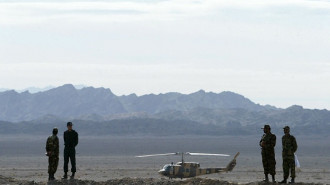Egyptian authorities bar Iraqis, Yemenis from travel to US
Five Iraqi passengers and one Yemeni were barred from boarding an EgyptAir flight from Cairo to New York on Saturday, Reuters has reported quoting airport sources.
The incident follows President Donald Trump's ban on the entry of citizens from seven Muslim-majority countries coming into effect.
The passengers, arriving in transit to Cairo airport, were stopped and re-directed to flights headed for their home countries despite holding valid visas, the sources told Reuters.
It is not clear whether such measures will be enforced in airport around the world, but Egypt's President Abdel Fatah al-Sisi regime is already on friendly terms with Donald Trump, and appeared eager to enforce the ban on Saturday.
US President Donald Trump on Friday signed an executive order to temporarily halt refugee resettlement and severely tighten restrictions on travel and immigration, specifically from seven Muslim-majority nations, according to a draft of the order.
The White House did not immediately release the text of the executive order signed by Trump at the Pentagon on Friday afternoon, however several news organisations had obtained the draft in the past few days.
At a ceremony at the Pentagon to swear in James Mattis as his secretary of defence, Trump signed a decree entitled: "Protection of the nation from foreign terrorist entry into the United States".
Trump said he is establishing "new vetting measures" to keep "radical Islamic terrorists" out of the US. "We don't want them here," he added.
The leaked draft order showed that Trump would block all refugees from entering the US for 120 days and suspend the acceptance of refugees from Syria indefinitely.
The president would also block all visa applicants from Syria, Iraq, Iran, Libya, Somalia, Sudan and Yemen, who would be subjected to "extreme vetting" according to the draft.
"We want to ensure that we are not letting into our country the very threats that our soldiers are fighting overseas," Trump said at the Pentagon before signing the order.
Civil liberties groups have condemned the measures, arguing that they target one specific group.
Trump's supporters defend the measures as necessary to prevent supporters of al-Qaeda or the Islamic State group from infiltrating the US disguised as refugees.
![EgyptAir [AFP] EgyptAir [AFP]](/sites/default/files/styles/large_16_9/public/media/images/422265E6-39ED-424B-8C74-41F90F6F4BEE.jpg?h=d1cb525d&itok=mUBoAICO)
![Palestinians mourned the victims of an Israeli strike on Deir al-Balah [Getty]](/sites/default/files/styles/image_684x385/public/2024-11/GettyImages-2182362043.jpg?h=199d8c1f&itok=xSHZFbmc)


![The law could be enforced against teachers without prior notice [Getty]](/sites/default/files/styles/image_684x385/public/2178740715.jpeg?h=a5f2f23a&itok=hnqrCS4x)
 Follow the Middle East's top stories in English at The New Arab on Google News
Follow the Middle East's top stories in English at The New Arab on Google News
![Fakhrizadeh [AFP] Fakhrizadeh [AFP]](/sites/default/files/styles/image_330x185/public/media/images/774C39F7-8F7A-4D67-B998-27D102FCB4A7.png?h=d1cb525d&itok=j9eGvunV)

